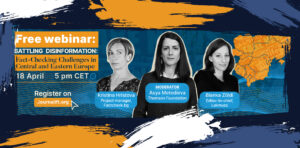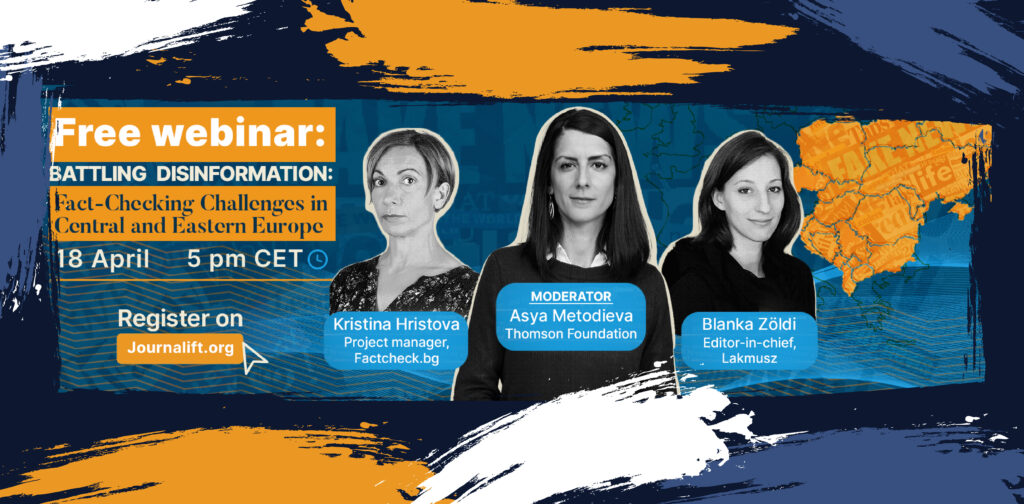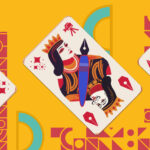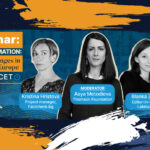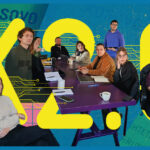It all started from the fear that young girl Anđela, who lives with her mother at the edge of existence in a mountain village in the South of Serbia, will not have food during the curfew. Tamara Misirlić, a student in the final year of secondary school from Vranje, allocated a part of her scholarship, bought groceries and travelled 50 km to deliver them to Anđela and her mother during the state of emergency caused by the coronavirus epidemic. Some 18 months later, the number of families she helped increased to more than 40. Some of them even got a roof over their heads.
One of them is the family of Marija Pejković, a single mother with three children from the village of Radonjica near Leskovac. Both her daughters are ill, Miljana (18) has a diagnosis of Williams syndrome, and Anđela (13) is visually impaired. Their father left them and their brother Miljan (16) when they were little kids. After several operations on her spine, Marija is not capable of work. Until recently, this family slept, ate and had a bath in the same room, in an old dilapidated house. Tamara helped them not to wait for the coming winter at the same place.
One of the numerous reasons why she helps the “invisible people” is the one that she firmly believes that “no one should feel rejected”, says Tamara, who has enrolled for two faculties this year, with maximal scores. She was born with polydactylies and had six developed fingers on both hands and toes on both feet until the operation several years ago. In a rigid environment, this has left scars that cannot be seen.

“I know perfectly what it is like when you’re rejected, those looks when you’re different. Nobody deserves that”, says Tamara.
The same was familiar to two girls from Skopje, who met 12 years ago in a ward of the Children’s Oncological Clinic. One at the end, the other at the beginning of chemotherapy. Today, knowing what children with diagnosed cancer go through and how big is their need to have someone to help and lead them through the process, the two girls volunteer at the Clinic.
Ilda has joined Teodora and Andrijana through the SANO Association. They are related by the illness, loss of hair due to chemotherapy, but also something more than that – their character and wish to help. When the whole country stopped last year for the coronavirus, they did not withdraw. During the pandemic, they started the action of hair donation and making of wigs for children who were treated at the Children’s Oncological Clinic.

Youth paralysed by the crisis, but they help when called on
During the pandemic in Serbia, there were not many young people like Tamara and girls from Skopje. According to the National Youth Council of Serbia, only 22.6% of this population helped the community during the covid crisis, and most of them did it on their own initiative.
On the other hand, although passive and worried at first, youth in North Macedonia became ever more engaged in time, when it comes to the support to mental health and pressure on institutions to improve their status, say our colleagues from the Youth Educational Forum (YEF).
“Large number of young people suffer from anxiety, depression, sleep and general disorders as a consequence of this situation”, say people from the Youth Educational Forum.
Forced to change their way of living, they faced the loss of income. From the beginning of the state of emergency until October this year, there were 4,518 persons younger than 34 who were made redundant, and the unemployment rate increased by 12.10%. The state did its best to help, but the support to youth was not sufficient, say people from the Youth Educational Forum.
Young people in Serbia are in the same boat. According to a survey conducted by the OSCE Mission in Serbia and the National Youth Council of Serbia, when the state of emergency started, around 56% until then employed started to lose their regular income. More precisely, 24.7% of young people continued to work occasionally, while more than 21.7% were made redundant. As the waves came one after another, around 9.1% dismissed returned to their jobs, but 12.6% remained without any income. In larger areas, like Skopje, where there are civic associations that have volunteers, the response to the crisis seems easier, regardless of the unemployment.
However, when it comes to a place like Vranje, there are few options for the youth to move, says out collocutor Milica Anđelković Jovanović, sociologist. According to her words, the NGO sector merely exists. Informal groups barely survive because they are mainly volunteering ones, and party activists are involved in ad hoc activities on an interest basis, without their personal “human motive to get involved truly”, explains Ms Anđelković.
“Youngsters who would like to change something out of their pure heartly feelings, find it difficult to find the way and support to do so. Bombed by cheap entertainment from all sides and dreams of easy life and on how to leave their hometown, they opt to focus their energy on leaving rather than on changing something while they are still there”, she stresses.
Unlike their parents, who experienced the 1990s, wars and inflation, this generation has faced a big crisis for the first time, one of global scale. At the same time, the state often sees them as key suspects for virus spreading. This is why one should not be surprised with their paralysis when it comes to the response to a crisis which has jeopardised even the best healthcare systems in Europe. Instead, older generations responded to the crisis in Vranje.
The hospital in this city, where at a certain moment 200 patients did not know if their turn to oxygen would come, found itself in the pandemic without enough stands for infusion, medications, oxygen masks, bedsheets, manometers, basic sanitation material… Informal civic association, with the logistic support of the Centre for Media Transparency and Social Responsibility, got organised and succeeded in improving the conditions in covid hospitals within only three weeks.
A year later, a need appeared in the community to help children from Vranje whose one or both parents were taken away by corona, and the call for help was published on Facebook by our collocutor Milica Anđelković Jovanović. Soon afterwards, the call was responded to by several hundreds of women. A “Female Solidarity Fund” was created and in the charity ball, organised in August this year, they collected more than Eur 5,000 and 26 direct donations.

The group that has made life of children from 20 families who lost their members of corona easier, was joined by a doctor of the Vranje Health Centre, Nataša Stojiljković – she says that youth may be lethargic and apathetic, but they would not have succeeded in the field without their help.
It seems that the end of the pandemic is still far from our eyesight. However, the masks we have been wearing for more than a year and a half, did not muffle the voice of the youth. These girls are a positive example that youth in these areas are surely a voice, not an echo.
Written By: Teodora Cvetkovska (North Macedonia), Teodora Noveska (North Macedonia), Sanja Petrov (Serbia)









